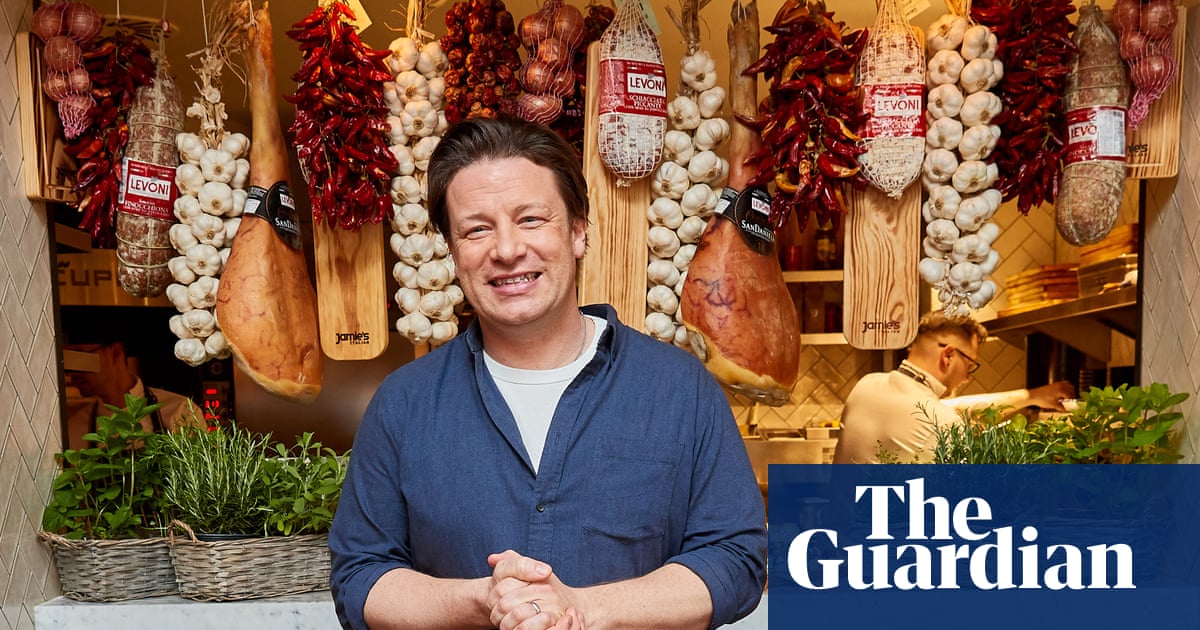
Jamie Oliver is to turn the remains of his business empire into an ethical “B Corporation” that officially gives equal weight to people, the planet and profit.
The former Naked Chef sees it as a way to knit his campaigning on issues such as childhood obesity and animal welfare into the fabric of the business which, following the collapse of the Jamie’s Italian chain, encompasses his successful publishing, broadcasting and licensing interests.
Billed as a fair trade label for companies, the B Corp movement describes itself as a “global movement of people using business as a force for good”. It is gaining momentum as the climate crisis coupled with rising inequality sees business leaders question what success looks like in the 21st century. B Corps commit to focusing as much on social and environmental concerns as they do on profits – the so-called “triple bottom line”.
So far more than 3,000 companies globally have become B Corps after completing a certification process that can take anything from weeks to several years, depending on the size and complexity of the business. High profile B Corps include the outdoor clothing brand Patagonia and The Body Shop owner Natura. Today there are 217 B Corps in the UK, up from just six companies in 2014.
The plan emerged as the Jamie Oliver Group published its first social impact report which it describes as the first step to becoming a “leading social impact business”. In it Oliver, who got his big break when a visiting TV crew spotted him working at the River Cafe in Hammersmith more than 20 years ago, admits that “my business is not perfect” with the administration of his restaurant chain making 2019 a “difficult” year.
The collapse of Jamie’s Italian which resulted in more than 1,000 job losses was an emotional and financial blow for Oliver, who had pumped £26m of his own cash into the venture. “With the restaurants, we had the best of times and the worst of times,” he said in a recent interview. “Now I’ve seen a lot, know a lot, smelt a lot, felt a lot. I won’t ever operate in the same way again. But I still think there is a lot more to give. I’m not going to go off into the sunset.”
The outspoken chef shocked fans last year when he signed deals with Tesco and the Shell oil company, but in the report Oliver argues that these partnerships fit with his ambition to make healthy food affordable and accessible. In defence of the multi-million-pound Shell deal, Oliver says drivers can now pick up healthier snacks with high-sugar energy drinks removed from the meal deal in its service stations.
From now on Oliver, whose cookbooks have made him the bestselling non-fiction author in UK history, says he will only strike commercial deals that help towards his goal of halving childhood obesity by 2030. The company has only just begun looking at what is entailed by the B Corp certification process.
Chris Turner, the executive director of B Lab UK, the charity tasked with growing the B Corp movement in Britain, said it was seeing a “dramatic surge” in the number of businesses looking to become certified: “Businesses of all sizes, and across industries, are recognising the need to change how business operates. By becoming a B Corp they make a meaningful commitment to make this change and to prove that business can be a force for good.”
The role of business to do more for society and the environment as well as shareholders is gaining traction. This week, the influential American Business Roundtable group – whose members include include Jeff Bezos, the founder and chief executive of Amazon (and the world’s richest person) – changed the official definition of “the purpose of a corporation” from making the most money for shareholders to “improving our society” by also looking out for employees, caring for the environment and dealing ethically.
What is a B Corp?
B Corps are companies that put people and the planet on the same footing as profits.
To become a B Corp, a company must go through a rigorous independent assessment that looks at the environmental and social impact of its business activities. This process can take weeks, months or even years depending on the size and complexity of an organisation: for example, the French food giant Danone is certifying its subsidiaries one at a time with a goal of being fully certified by 2030. There are now more than 3,000 B Corps around the world with a combined turnover of $63.7bn.
B Corps must also make a change to their governance to embed these principles. In the UK this is achieved by amending their articles of association.
• Sign up to the daily Business Today email here or follow Guardian Business on Twitter at @BusinessDesk.